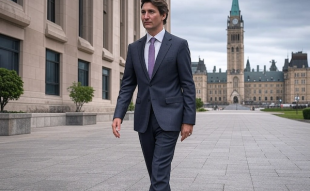Curaçao, renowned for its longstanding role as a central hub for international gambling operators, is currently embroiled in significant corruption and cryptocurrency-related scandals. Recent developments have brought intense scrutiny to the island’s regulatory practices, implicating high-level officials and major players within both the gambling and crypto sectors.
Allegations Led by Luigi Faneyte
The spotlight intensified when Luigi Faneyte, an opposition politician and expert in financial forensics, spearheaded allegations against key figures in Curaçao’s financial and regulatory landscape. On December 12, 2024, Faneyte filed a comprehensive criminal complaint targeting Javier Silvania, the Minister of Finance, along with several members of the Gaming Control Board (GCB). This complaint outlines a series of serious offenses, including fraud, document falsification, money laundering, and irregularities in licensing processes.
At that point, it was clear to me that the process surrounding the issuance of these licenses was chaotic. For example, the Dutch Gambling Authority manages only a fraction of the number of licenses compared to Curaçao and employs over 100 people. When, during an organized meeting, representatives from the GCB stated that Galea was using ‘Artificial Intelligence’ to issue licenses, I knew things had gone seriously wrong. When crypto casino BC.Game was declared bankrupt on November 12, 2024, I decided that enough was enough and began preparing the report. – Faneyte
Unregulated Licensing and Crypto Casino Connections
Faneyte’s complaint highlights that under Silvania’s leadership, provisional online gambling licenses were granted at an unprecedented rate, often without adequate oversight or adherence to regulatory standards. This lax approach facilitated the emergence of unregulated crypto casinos, which operated outside Curaçao’s established regulatory framework. These casinos were able to offer their services with minimal repercussions, suggesting possible collusion with high-ranking officials.
Cryptocurrency and Money Laundering Concerns
The investigation delves deeper into the role of cryptocurrency within the crypto gambling sector. Evidence suggests that the GCB permitted crypto transactions without proper regulation, enabling grey market platforms to conduct anonymous operations. Such unregulated activities are believed to have created opportunities for money laundering, with potential implications reaching across international borders. Countries like the United States, Malta, and the Czech Republic have reportedly been affected by these illicit financial flows, raising alarms about the broader impact on global financial systems.
International Implications and Malta’s Involvement
One of the most troubling aspects of the scandal involves Malta, another key player in the global gambling industry. Faneyte’s findings include a transcript from a phone conversation between a former official from the Malta Gaming Authority and a representative of a controversial gambling platform. In this call, they allegedly discussed the creation of fake agreements to manipulate data records, actions that directly violate Curaçao’s criminal code. This revelation suggests that Malta could face increased international scrutiny as authorities seek to address the widespread corruption.
Impact on Curaçao’s Gambling Reforms
The timing of these allegations is particularly critical as Curaçao is in the process of modernizing its gambling laws through the recently ratified National Ordinance for Games of Chance (LOK). The corruption exposed by Faneyte undermines these efforts, casting doubt on the government’s ability to implement effective reforms and restore trust in its regulatory institutions. The ongoing scandal has sparked widespread criticism, with many stakeholders calling for immediate and decisive action to address the systemic issues.
Curaçao: A Rich Tapestry of History and Culture
Curaçao, the largest of the Dutch Caribbean islands, boasts a vibrant history and a diverse cultural heritage shaped by centuries of colonial influence and indigenous traditions. Originally inhabited by the Arawak and Caquetío peoples, the island was claimed by the Spanish in the late 15th century before being ceded to the Dutch in the early 17th century. This colonial legacy is evident in Curaçao’s architecture, with the capital city, Willemstad, featuring colorful Dutch-style buildings and the iconic Queen Emma Bridge. The island’s culture is a melting pot of African, European, and Latin American influences, reflected in its music, festivals, and cuisine. Events like the Curaçao Carnival and the North Sea Jazz Festival highlight the island’s lively spirit and its residents’ passion for celebration and artistic expression.
Economic Landscape: From Tourism to Technology
Curaçao’s economy is multifaceted, with tourism being a primary driver due to its stunning beaches, clear turquoise waters, and rich cultural attractions. The island attracts visitors from around the world, contributing significantly to employment and local businesses. Beyond tourism, Curaçao has developed a robust offshore financial services sector, leveraging its strategic location and favorable tax regulations to attract international businesses. Additionally, the island has embraced technology and innovation, fostering growth in areas such as information technology and renewable energy. The government has also been proactive in diversifying the economy to reduce dependence on traditional sectors, promoting entrepreneurship and investment in emerging industries to ensure sustainable economic growth.
Gambling and Cryptocurrency Regulations: Navigating a Complex Landscape
Curaçao is renowned for its well-established gambling industry, which operates under one of the oldest online gambling licenses in the world. The Curaçao eGaming License Authority regulates both online and land-based gambling, providing a framework that attracts numerous international operators due to its relatively straightforward and cost-effective licensing process. Curaçao’s approach to cryptocurrency regulation has been intended to balance innovation with security, implementing measures to ensure that digital transactions comply with international standards.
Global Attention and Future Investigations
The cross-border nature of the alleged crimes has not gone unnoticed by international authorities. The involvement of entities from the United States and the Czech Republic has elevated the case’s profile, potentially leading to increased global scrutiny of Curaçao’s gambling industry. In response to these developments, Luigi Faneyte has established Lokinvestigation.com, a dedicated platform aimed at tracking the progress of these investigations and providing transparency to the public.
Broader Implications for the Gambling and Crypto Industries
This scandal in Curaçao underscores the vulnerabilities within the gambling and cryptocurrency industries, particularly in jurisdictions that serve as regulatory havens. The interplay between rapid licensing, inadequate oversight, and the rise of crypto-based gambling platforms highlights the challenges regulators face in keeping pace with technological advancements and evolving business models. As the investigation unfolds, it will likely prompt other regions to reevaluate their regulatory frameworks to prevent similar abuses and ensure greater accountability within the industry.
Reputation Under Threat
Curaçao’s reputation as a key gambling hub is now under significant threat due to the unfolding corruption and crypto-related scandals. The allegations against high-ranking officials and regulatory bodies reveal deep-seated issues that could have far-reaching consequences for the island’s economy and its standing in the global gambling community. As international authorities take a closer look and reforms are pushed to the forefront, the future of Curaçao’s gambling industry hangs in the balance, highlighting the urgent need for transparency and integrity in its regulatory practices



